- Home
- POSTER GALLERY
- ❗️BOOK & POSTER STORE❗️
- About the Posters
- The William Gillespie Collection
- Our Publishing House
- ❗️GFDN interviews author and collector William Gillespie ❗️
- Our most expensive & inexpensive finds!
- ❗️***NEW!*** Poster of the Month ❗️
- ❗️NEW ❗️Film Posters – Demands on an important means of film advertising. ❗️
- In our Book + Zeitschrift Library
- ❗️ ***NEW!*** Hitler Youth Quex – A Guide for the English–speaking Reader ***NEW!*** ❗️
- ❗️***NEW!*** Table of Contents of our new HJ QUEX book❗️
- ❗️Hitler Youth Quex Guide - early praise! ❗️
- Recent loans from the Collection
- Farewell Horst Claus. (1940–2024)
- "Der Deutsche Film" Zeitschrift
- ❗️ ***NEW!***German "Tendency" Films (Tendenzfilme) in the Third Reich ❗️
- KARL RITTER
- Karl Ritter original film posers in this Collection
- "Besatzung Dora" ( † 1943)
- "The Making of The Crew of the Dora"
- Karl Ritter at the 1938 Reichsfilmkammer Congress
- INDEX -"Karl Ritter" book, 2nd edition
- Karl Ritter's Legion Condor (1939, unfinished)
- Excerpt from our "Dora" book
- ∆∆∆∆∆ High praise for our DORA book! ∆∆∆∆∆
- TABLE OF CONTENTS – "Legion Condor"
- § § § § § Early Praise for our LEGION CONDOR book! § § § § §
- ❗️"Das Leben geht weiter" and Karl Ritter ❗️
- Zarah Leander Europe–wide !
- Japan Military Film and Karl Ritter
- Karl Ritter after 1945
- 1935 Film Congress
- Poster Exhibition in Berlin, March 1939
- Potsdam poster exhibition 12 April–25 August 2019
- Leni Riefenstahl's two "Olympia" Films (1938)
- "Ohm Krüger" (1941)
- Emil Jannings
- "Blutendes Deutschland" (1933)
- Hannes Stelzer ( † 1944)
- Klaus Detlef Sierck ( † 1944)
- Film stills
- Reich Film Censorship Offices
- ❗️Dateline: Ufa - April 11, 1945 ❗️
- ❗️***NEW!***The Fate of the German Film Industry in May 1945 ❗️
- Film censorship cards
- Film Archives
- Cinema advertising
- School filmstrips
- ❗️UPDATED❗️ Z F O / Ostland Film G-m-b-H
- Z F O / Herbert Jacobi estate
- ZFO / Ostland Film newspaper articles
- ❗️***NEW!*** Roter Nebel / Red Fog / Red Mist (1942/1943, ZFO) ❗️
- ZFO - Der Rückkehrer - The Returnee (1943/1944)
- The D F G production company
- D I F U
- ❗️ ***NEW!*** "Carl Peters" – Special Collection. ❗️
- "Alcazar" (1940, Genina)
- "Der 5. Juni" (1943, banned)
- ❗️ ***NEW!*** Herbert Selpin and his "Titanic" (1943) ❗️
- ❗️ ***NEW!*** Ein Robinson (1940, Fanck) ❗️
- "Fronttheater" (1942)
- Veit Harlan's Jud Süß and Fritz Hippler's Der Ewige Jude
- Harlan "Jud Süß" trial 1949
- Werner Krauss & JUD SÜß
- Anti-Semitic Film Posters in the Collection
- "Heimkehr" (1941)
- "Hitlerjunge Quex" (1933)
- ❗️***NEW!*** Hitlerjunge Quex in 111 Greater Berlin Cinemas ❗️
- Jürgen Ohlsen
- "S.A.Mann Brand" (1933)
- "In der roten Hölle" (Edgar Neville, 1939)
- "Helden in Spanien" (1938)
- The Spanish Civil War in Film
- Andrews Engelmann (1901 – 1992)
- Deutsche Wochenschau
- Uƒa Feldpost
- Uƒa Kulturfilm – Informationen
- " Die Tochter des Samurai" (1937, Fanck)
- Ufa 25th Anniversary
- Invitations to world premieres
- ❗️***NEW!*** Continental Films, Paris 1940–1944 ❗️
- Film Censorship in Occupied Paris 1942
- "Der Sieg des Glaubens" (1933)
- Wilhelm Althaus Estate
- Weimar Germany posters
- Ufa and the Ordensburgen
- The Gaufilmstelle in our Collection
- "Zwei Welten" (1940)
- "Capriccio" (1938) –Karl Ritter film album
- Unrealised NS Propaganda Films 1934–1945
- German Film Directors accused of "war crimes"
- Australian––themed NS feature films
- "Der Störenfried" / "The Troublemaker"
- What was new in 2014?
- What was new in 2015?
- What was new in 2016?
- What was new in 2017?
- What was new in 2018?
- What was new in 2019?
- What was new in 2020?
- What was new in 2021?
- What was new in 2022?
- What was new in 2023 ?
- What's new in 2024?
- ❗️***NEW!*** Hitler assassination attempt in Karl Ritter film cut❗️
- BESATZUNG DORA private photos
- Just discovered 1942 article on BESATZUNG DORA
- The Karl Ritter Tetralogy
- Google Analytics 2023
- Our first–ever acquisition!
- ❤️"Some of our favourite things....!"❤️
- ERRATUM for our " Hitler Youth Quex Guide"
- Trending
- Vale †
- Our Wants List / 2024 / Wunschliste
- Pop Quiz
- Unsere KARL RITTER Bücher in Deutschland liefbar!
- WHERE to buy our books right now?
- ✉️Contact
 “History is not about the facts. It is about the context and who is telling the story.” —Prof. Milton Fine.
“History is not about the facts. It is about the context and who is telling the story.” —Prof. Milton Fine.
"Who controls the past controls the future: who controls the present controls the past." –– George Orwell in his novel "1984."
"Whoever doubts the exclusive guilt of Germany for the Second World War destroys the foundation of post–war politics." –– Prof. Theodor Eschenberg, Rector, the University of Tübingen.
"If we have our own why in life, we shall get along with almost any how." – Friedrich Nietzsche
POSTER GALLERY --view
over 500 German film
original posters between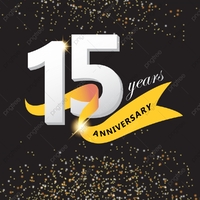
1927–1954 from
Germany and from
many Axis and Neutral countries
across Europe!
Note! Posters in the Poster Gallery are PERMANENT
acquisitions which are NOT FOR SALE!! ONLY the
posters listed in our POSTER STORE are for sale.
(They have a price and order button to use.)
Hitler assassination attempt at the
Bürgerbräukeller on November 9, 1939 re-
created in the Karl Ritter film Über alles in der
Welt cut by Dr. Goebbels
In our collection is the original film script for the Karl Ritter WWII film Über alles in der Welt, which is dated 22 March 1940 on the title page.
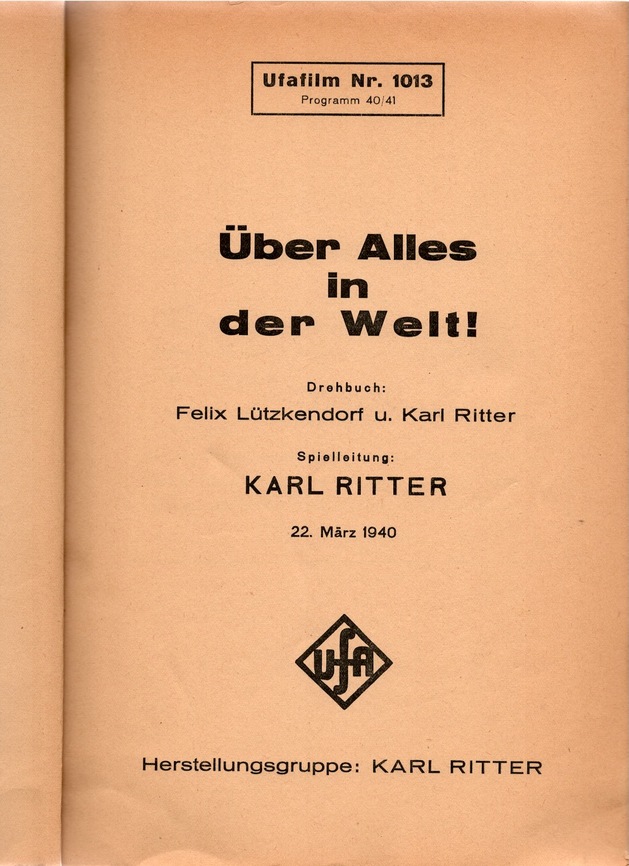
In the script, a rather surprising series of scenes is depicted, in which the attempt [by George Elser] to assassinate the Führer in the beer hall in Munich during the annual November 9th Putsch ceremonies failed, due to Hitler's uncanny decision to depart the cellar very shortly after he delivered his speech. The 2021 Elser feature film telling of this plot's story is titled 13 Minutes.... the short time span after Hitler's departure at which the bomb blew up.
Karl Ritter's idea as the film script co-author, was to depict this event as an intrigue of the British Secret Service, which was the commonly held belief at the time by both the Gestapo and the German general public. The scene was to be followed by one in which the foreign broadcasting station funded by Great Britain, located in Paris; and manned by Austrian exiles, was to report on the assassination attempt. In this way, the film was setting the stage for a strong anti-British, anti-French propaganda message.
Our script has the assassination scenes in it, and the scenes were in fact filmed, but they do not exist in the cinema release print shown in the Third Reich cinema print, and do not appear in the restored print for sale by International Historic Films as a DVD.
Dr. Goebbel's diaries hold five separate entries on the film but the early ones talk about the script when it was first read by the Minister, and the last ones speak about the film as a propaganda film, but there are no entries about the assassination scenes.
The most recent discovery and publishing of the heretofore lost Alfred Rosenberg diaries fill in the blanks. On May 8, 1940 Rosenberg's diaries mention a visit by Karl Ritter's wife, Erika, to his offices, distraught about her husband's film. Rosenberg remarks that she is Richard Wagner's grand-daughter, wheres Erika was in fact his grand-niece. The diary reads:
"Frau Ritter,Richard Wagner's granddaughter, has been distressed for years. Today she was in my office, fairly distraught. Her husband has a new film, Über alles in der Welt, where the assassination attempt on November 9, 1939, is woven into the plot. The question: should it be shown on screen or not. It could be decided this way or that. But Dr. G[oebbels] says to R[itter]: Shoot the film, but in such a way that this whole assassination business could also be left out.—"
Dr. Goebbels obviously, then, decided it safer to have those scenes removed. We reproduce below some of the relevant pages from the script, with English translation.
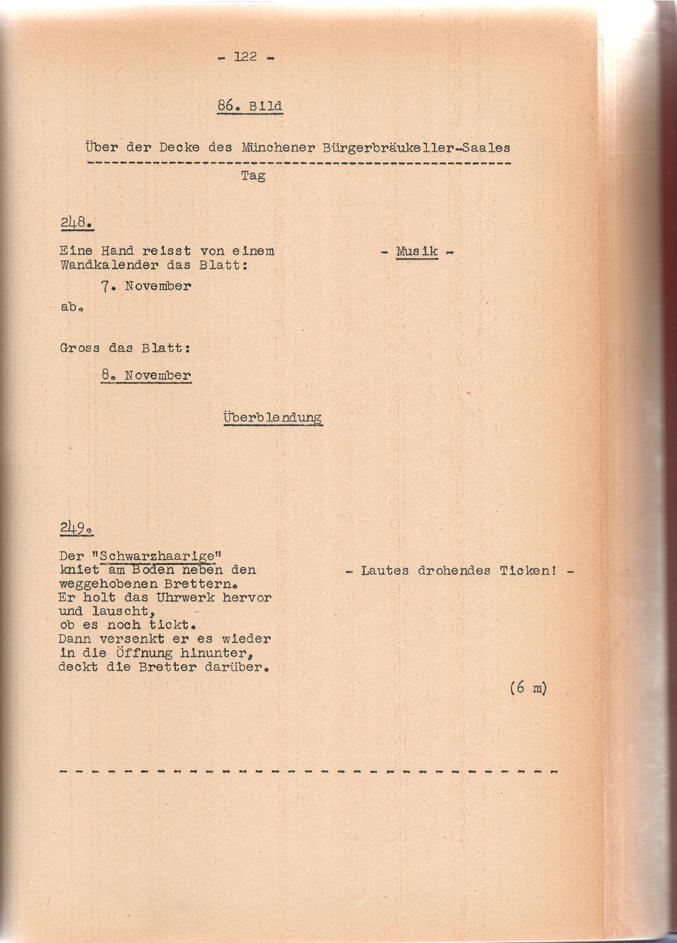
Translation:
Script page -122-
86th Scene
Above the ceiling of the Minchener Bürgerbräukeller hall. Day.
Camera shot 248. A hand tears the page from a wall calendar: 7 November. Large the sheet: November 8th page. Fade.
Camera shot 249. The "black-haired man" kneels on the ground next to the boards that have been lifted away. He takes out the clockwork and it's still ticking. Then he sinks it back into the opening and covers the boards over it. - Loud threatening ticking! -
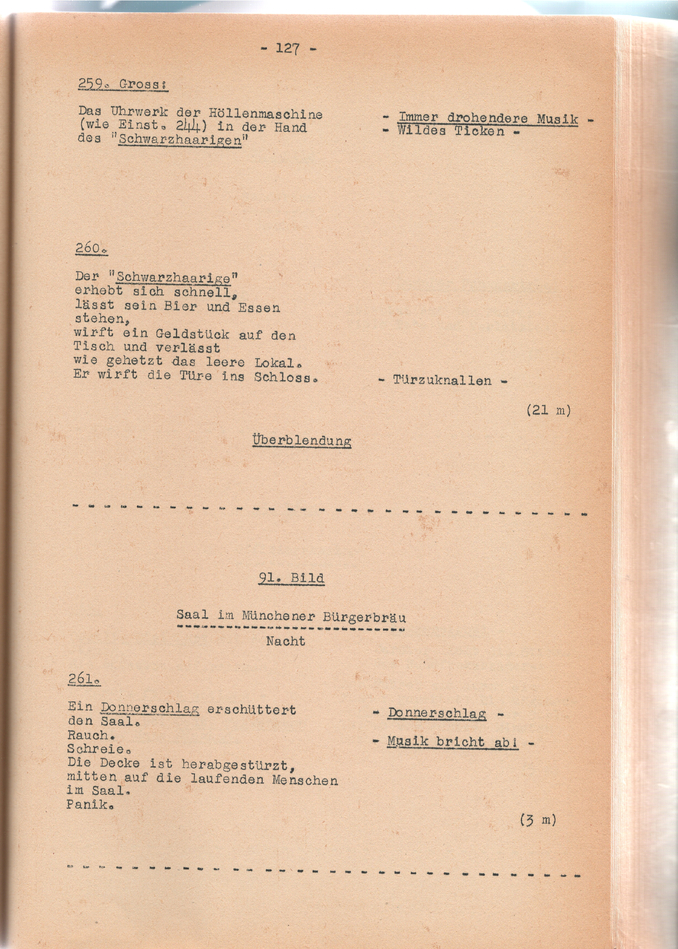
Translation:
Script pg -127-
[90th Scene, cont’d.]
Camera shot 259: Large: The clockwork of the infernal machine (like Camera Shot 244) in hand of the "black-haired man" More and more threatening music - - Wild ticking -
Camera Shot 260- The "black-haired man" gets up quickly, leaves his beer and food on the table and leaves the empty restaurant as if rushed. He slams the door shut. - door slamming - (21m) Crossfade.
Scene 91. Image: Hall in the Munich Bürgerbräu Night
Camera shot 261. A clap of thunder shakes the hall. Smoke. Screams. The ceiling has fallen down, right in the middle of the people running in the hall. Panic. - thunderclap - -Music stops! - (3m)
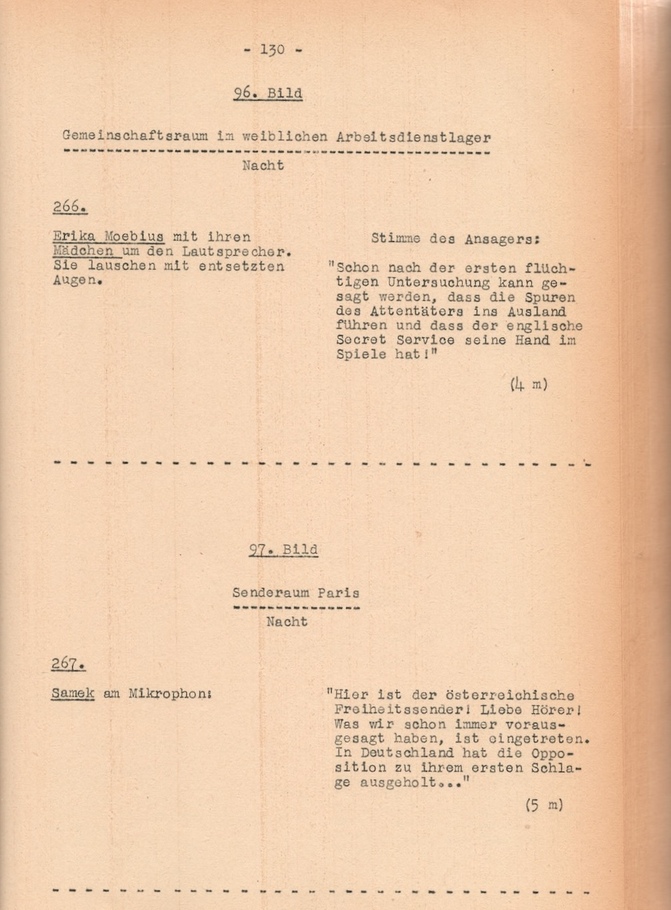
Translation:
Script pg. - 130 -
Scene 96. Image: Common room in the female labor service camp. Night
Camera shot 266. Erika Moebius with her girls around the loudspeaker. They listen in horror Eyes. Announcer's voice: "After the first cursory investigation, it can be said that the assassin's tracks lead abroad and that the English Secret Service has a hand in it!" (4m)
Scene 97• Image: Paris broadcasting room. Night.
Camera shot 267. Samek on the microphone: "This is the Austrian freedom station! Dear listeners! What we always predicted has happened. In Germany the opposition has struck its first blow…" (5m.)
The "black-haired" assassin is so named to signify that he is possibly a Jew, as in the script he is also described as "swarthy" and these are code words for non-Aryans. The character Leo Samek, who is the Austrian exile broadcaster of the anti-Nazi radio station, is depicted with a Jewish accent in the film, played by an overweight, unattractive, boisterous Oscar Sima.
Copyright ©2024, German Films Dot Net.